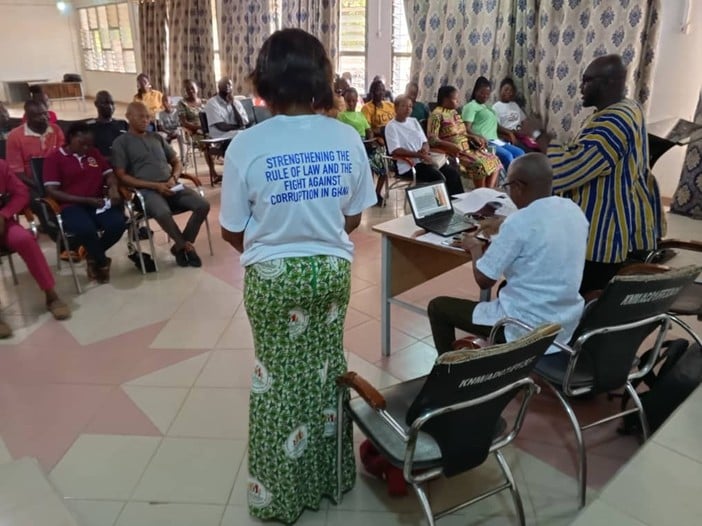The National Commission for Civic Education (NCCE), in collaboration with the European Union (EU) and the Deutsche Gesellschaft für Internationale Zusammenarbeit (GIZ), organized a significant civic engagement forum in Navrongo, Ghana, focusing on the informal sector. This initiative, themed “Civic Engagements on the Rule of Law and the Fight Against Corruption,” aimed to empower citizens with knowledge and tools to combat corruption and promote good governance. The forum brought together a diverse audience, including representatives from various informal sector occupations such as tailors, hairdressers, market women, and mechanics, along with youth groups, faith-based organizations, civil society organizations (CSOs), and the Commission on Human Rights and Administrative Justice (CHRAJ). This diverse representation underscores the NCCE’s commitment to reaching a broad spectrum of society and fostering a collective responsibility in tackling corruption.
The core objective of the forum was to equip participants, especially those in the informal sector, with a clear understanding of vital legal instruments like the Whistleblower Act and the Right to Information Law, alongside the fundamental principles of the rule of law. Ms. Felicia Ajongbah, the Municipal NCCE Director, emphasized the critical role of informed and engaged citizens in building a just and prosperous society. She stressed that combating corruption is not solely the responsibility of institutions but a collective duty demanding active civic participation. The focus on the informal sector stems from the recognition that this segment, constituting a significant portion of Ghana’s workforce, often lacks access to crucial legal and civic education, rendering them vulnerable to exploitation and corrupt practices.
The NCCE’s strategic approach involves prioritizing civic education within underserved communities. This targeted approach aims to empower citizens, particularly the youth, to confidently expose wrongdoing without fear of reprisal. By disseminating knowledge about the Whistleblower Act, the NCCE strives to instill a sense of civic duty and encourage active reporting of corruption. This initiative aligns with the broader national strategy to strengthen democratic governance and uphold the rule of law by actively involving citizens from all walks of life in the fight against corruption. The emphasis on youth engagement highlights the importance of fostering a culture of accountability and integrity among future generations.
Mr. Abdul-Gafaru Issahaku, the Municipal Director of CHRAJ, provided a comprehensive presentation on identifying and reporting corrupt practices. He highlighted prevalent forms of corruption in Ghana, including bribery, nepotism, facilitation payments, embezzlement, and conflicts of interest. By elucidating these various manifestations of corruption, the forum aimed to equip participants with the knowledge to recognize and address these issues within their communities. Mr. Issahaku emphasized the systemic factors contributing to corruption, such as weak law enforcement, inadequate accountability mechanisms, poor record-keeping, and low levels of institutional integrity. He underscored the importance of legal frameworks like the Whistleblower Act, the Special Prosecutor Act, and the Right to Information Act as crucial tools for citizens to demand accountability and transparency.
The forum emphasized the debilitating impact of corruption, describing it as a “silent thief” that undermines institutions, erodes public trust, and diverts crucial resources meant for development. This characterization underscores the urgency and importance of addressing corruption to safeguard the nation’s progress and prosperity. The interactive nature of the forum encouraged participants to take an active stance against corruption by reporting misconduct and promoting transparency within their communities. This participatory approach fosters a sense of ownership and empowers individuals to become active agents of change in the fight against corruption.
In conclusion, the civic engagement forum in Navrongo represents a significant step towards deepening civic awareness and strengthening the fight against corruption in Ghana. By targeting the informal sector and empowering citizens with knowledge and tools, the NCCE, in partnership with the EU and GIZ, is fostering a culture of accountability and promoting active civic participation in the pursuit of good governance. The forum served as a platform to disseminate information about key legal instruments, educate participants about various forms of corruption, and encourage active reporting of misconduct. By fostering a sense of collective responsibility and empowering individuals to become agents of change, this initiative contributes to the broader national effort to strengthen democracy, uphold the rule of law, and build a more just and prosperous society.


